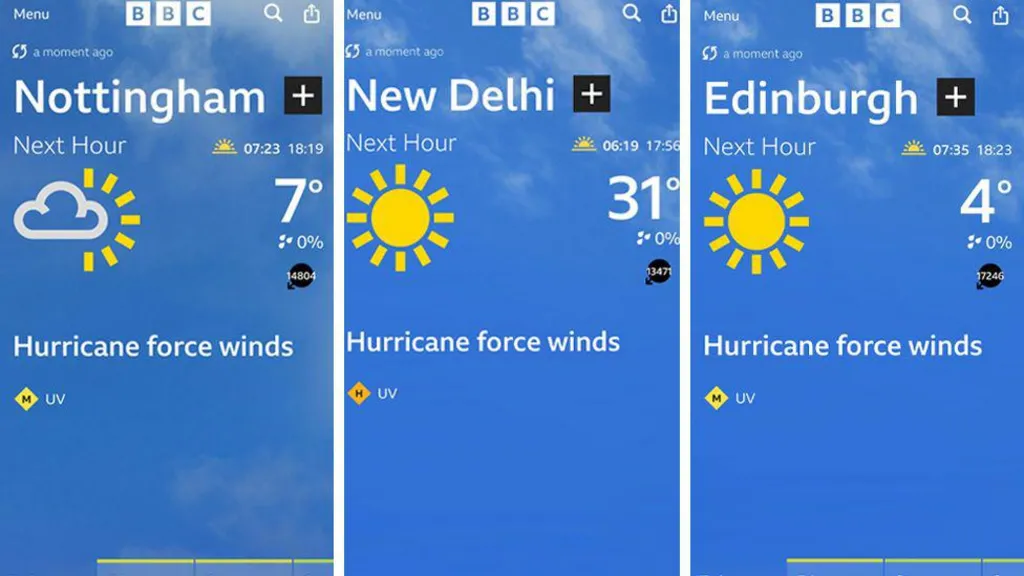
Global Impact of the BBC Weather Glitch
A BBC Weather glitch has caused incorrect hurricane forecasts across the UK and around the globe, alarming users with extreme wind speeds and temperatures. The technical fault resulted in forecasts showing wind speeds of over 13,000mph in cities like London and temperatures reaching 404°C in Nottingham, far beyond any real weather conditions.
BBC Weather Glitch and Its Impact
The glitch on BBC Weather led to erroneous predictions of hurricane-force winds and extreme temperatures, which were displayed across the platform. For example, London was forecasted to experience wind speeds of 13,508mph, while Rome showed wind speeds of 5,293mph. Such figures are significantly higher than those experienced in real hurricanes, such as Hurricane Milton, which recently hit Florida.
Alongside the exaggerated wind speeds, the temperatures displayed were equally misleading. Nottingham, New York, and Sydney were shown with temperatures of 404°C, 384°C, and 378°C respectively—clearly incorrect data.
The Cause of the Issue
BBC Weather has attributed the incorrect hurricane forecasts to a data issue with a third-party supplier. Meteorological forecasting company DTN, which supplies data to the BBC Weather platform, confirmed the glitch but did not provide a specific timeline for when the problem would be resolved.
BBC Weather presenters have also acknowledged the fault. Presenter Matt Taylor posted on social media platform X: “Don’t be alarmed folks—Hurricane Milton hasn’t made it to us here in the UK! There’s been a data glitch between our suppliers and the app/online. Folk are working to solve the issue.” Similarly, lead presenter Simon King assured viewers that the hurricane forecasts were a result of a data issue and should not be taken seriously.
Global Impact of the BBC Weather Glitch
The glitch affected weather forecasts globally. In cities like Edinburgh, Belfast, and Cardiff, users saw wind speeds between 12,000mph and 17,000mph. Even locations outside of the UK were impacted—forecasts for Paris and Bangkok showed hurricane-force winds of over 13,000mph.
However, real weather conditions were much calmer. In reality, the UK faced colder air moving in with rain and drizzle in southern areas, and wind gusts in Aberdeen reached a maximum of 33mph according to the Met Office. There was no genuine threat of hurricane-force winds as displayed by the faulty BBC Weather app.
BBC’s Response to the Glitch
In response to the incident, BBC Weather issued an apology, stating: “We have an issue with some of the weather data from our forecast provider which is generating incorrect numbers and text on our BBC Weather app and website. We recognize there is huge interest in weather today, and this is incredibly frustrating. We are really, really sorry about this and working very hard to fix the problem.”
BBC News confirmed that the glitch primarily impacted wind speed forecasts, and TV bulletins were not affected. The organization is working closely with DTN to ensure the accuracy of the data moving forward.
Hurricane Milton’s Real Impact
Meanwhile, Hurricane Milton made landfall in Florida as a category 3 storm, causing significant damage. The hurricane brought tornadoes, floods, and storm surges, leading to power outages for more than three million homes and businesses. The BBC Weather glitch erroneously extended the impact of this storm beyond Florida, alarming users in the UK and other parts of the world.
Hurricanes are powerful storms that develop over tropical waters and involve sustained winds of at least 74mph. Hurricane Milton, with winds reaching over 157mph in certain areas, caused considerable destruction along the Atlantic coast, emphasizing the importance of accurate weather forecasting.
For the latest updates on this story, visit the BBC or explore related analysis on Kenkou Land.





